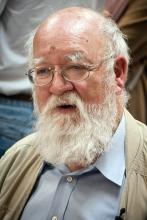Evolution, what Daniel Dennett calls “Darwin’s Dangerous Idea,” is far from uncontroversial, even in scientific and philosophic circles. Dan, John and Ken discuss where Darwin’s ideas stand in the modern debates, and it seems that evolutionary arguments are everywhere! So, what are the limits of Darwinism? Can Darwinian thinking really explain why men are prone to rape or how freedom evolved? Are there alternatives to Darwinism which the scientific community could accept?
As far as alternatives to evolution, everyone admits that many very intelligent people such as the philosopher Thomas Nagel have been tempted by intelligent design arguments. But Dan says that such arguments are simply wrong. John agrees that Dan may have successfully refuted these arguments, but he still finds the ‘emotion behind them’ very appealing, the intuition that there must be something else other than ‘cold’ evolution underlying all the wonders of the universe.
How far can evolutionary explanations go? Could there be an evolutionary explanation for our resistance to evolution? Dan says that we as human beings are ‘creators,’ artists, builders, and so on. We model our communal myths (such as religion) upon our own creative abilities. But, Ken wonders, is this an evolutionary explanation? Dan argues that it is at some level, since the members of the species who accepted these myths were more likely to reproduce.
Dan argues that evolution also underlies important differences in gender or even morality, and could help us to understand more complex questions than many people suspect. Basically, the simple reproductive differences between the sexes may account for many of the differences between the genders, including the male propensity to rape. But of course the discussion is left unfinished.
- Roving Philosophical Reporter (seek to 6:30): Molly Samuel travels to the Sierra Nevada mountains in a quest for endangered pikas. What does this have to do with Darwin? Well, the tops of mountains are ‘habitat islands,’ isolated ecosystems that are perfect for biologists to study evolution. Thus, just as the Galapagos helped Darwin first understand what species are, mountain tops are helping modern researchers understand how to protect the fragile species of our world.
- 60-Second Philosopher (seek to 49:10): Ian Shoales delves into Darwin’s biography to determine Darwin’s belief in God, an oft-debated claim. Darwin waited almost twenty years to publish origin of species, and many historians wonder if he spent these years wrestling with the religious implications of his work.

Comments (1)
Daniel
Thursday, February 9, 2023 -- 5:34 PM
Did the theory of naturalDid the theory of natural selection completely abolish teleological causes in biological explanation? It does a good job in explaining the diversity of life, but what about its unity? Is there really no jump between organic and inorganic matter in terms of evolutionary biology, determining the apparent difference as a topical phenomenon rather than a categorical distinction? And does this make rocks into primitive organisms, or organisms into complicated rocks? Remember that Kant's supposed defense of teleological explanation of biological phenomena has almost nothing to do with purposes themselves,* but rather with an apparent inadequacy of any thoroughgoing mechanistic explanation, when taken as instantiating a regulative principle, (not an objective causal one), to satisfactorily explain, famously, "even a single blade of grass". What role might intuition play here in the relation between one biological system, e.g. a biologist, and another, e.g. a bacterium observed in visual magnification by means of a microscope?
________
* See: McLauphlin, 1990.